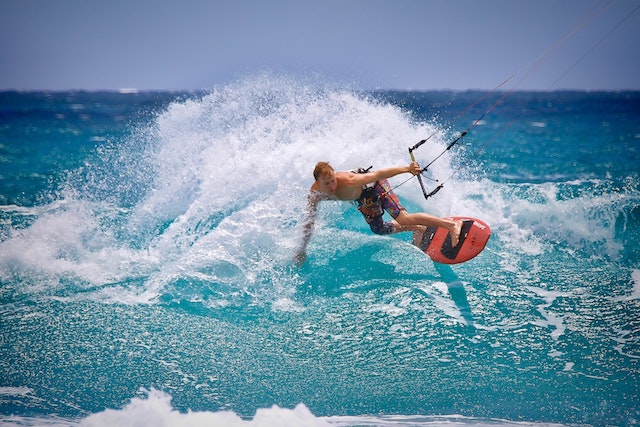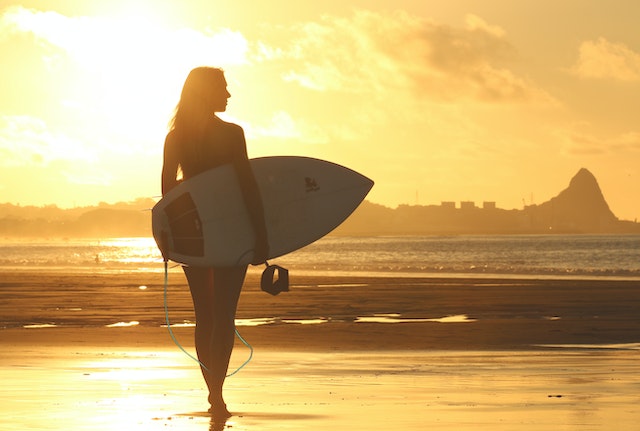Surfing is an exhilarating water sport that allows you to ride the waves and connect with the ocean in a unique way. If you’re new to surfing, the idea of catching your first wave might seem daunting, but fear not! With the right guidance and techniques, you can quickly progress from a novice to a competent surfer. In this article, we’ll share ten essential surfing tips to get you started on your surfing journey. Whether you dream of gliding gracefully on the waves or experiencing the thrill of a lifetime, these tips will set you on the right path.
Table of Contents
| Sr# | Headings |
|---|---|
| 1 | Choosing the Right Surfboard |
| 2 | Understanding Wave Breaks |
| 3 | Mastering the Paddling Technique |
| 4 | The Pop-Up: Going from Paddle to Ride |
| 5 | Finding the Sweet Spot on the Board |
| 6 | Maintaining Proper Balance |
| 7 | Timing is Everything |
| 8 | Respecting Surf Etiquette |
| 9 | Staying Safe in the Water |
| 10 | Persistency and Patience |
1. Choosing the Right Surfboard
Selecting the right surfboard is crucial for beginners. Opt for a long and wide board, such as a foam or soft-top board, which offers better stability and buoyancy. These types of boards make catching waves and finding your balance easier, allowing you to progress quickly.
2. Understanding Wave Breaks
Learn to read wave breaks. Observe how waves form, break, and roll towards the shore. Knowing when and where waves break will help you time your paddling and positioning to catch the perfect wave.
3. Mastering the Paddling Technique
Paddling efficiently is essential for catching waves. Use long, smooth strokes and keep your body flat on the board to reduce drag. This technique will improve your speed and maneuverability in the water.
4. The Pop-Up: Going from Paddle to Ride
Mastering the pop-up is a crucial skill. It’s the move that gets you from lying on your board to standing and riding the wave. Practice this motion on the beach before attempting it in the water.
5. Finding the Sweet Spot on the Board
Locate the sweet spot on your surfboard, which is the optimal area for balance and control. Position yourself correctly to maintain stability and avoid nose diving or losing control.
6. Maintaining Proper Balance
Surfing requires good balance. Keep your knees bent and your core engaged while riding the wave. A stable stance will help you adjust to the motion of the water and maintain control.
7. Timing is Everything
Timing is crucial in surfing. Patience is essential, as you’ll need to wait for the right wave to catch. With practice, you’ll develop a sense of wave timing and improve your wave-catching success rate.
8. Respecting Surf Etiquette
In the surfing community, there are unwritten rules that all surfers must follow. Respect the lineup, wait your turn, and avoid dropping in on other surfers’ waves. Observing surf etiquette ensures a harmonious surfing experience for everyone.
9. Staying Safe in the Water
Safety should be your top priority. Learn how to spot rip currents and avoid dangerous areas. Always surf in designated surfing zones with lifeguards present. Wearing the right safety gear, such as a leash and rashguard, is also crucial.
10. Persistency and Patience
Becoming a proficient surfer takes time and practice. Don’t get discouraged by initial falls or wipeouts. Stay persistent and patient, as each surfing session brings new learning opportunities and progress.
Conclusion
With these ten essential surfing tips for beginners, you’re well-equipped to start your surfing journey with confidence. Remember that surfing is as much about having fun as it is about mastering the waves. Embrace the learning process, stay determined, and you’ll soon be riding those waves like a pro!
FAQs
Q1: Can anyone learn to surf, regardless of age?
Absolutely! Surfing is a sport for all ages. Whether you’re a teenager or in your golden years, you can enjoy the thrill of surfing. Just start with the right beginner’s mindset and have fun!
Q2: Is it necessary to be a strong swimmer before learning to surf?
While being a strong swimmer is advantageous, it’s not an absolute requirement. However, it’s essential to be comfortable in the water and have basic swimming skills for your safety.
Q3: How long does it take to become a proficient surfer?
The learning curve varies from person to person, but with consistent practice and dedication, you can become proficient within a few months to a year.
Q4: Can I surf during the winter season?
Yes, you can surf during the winter season, but be sure to wear a suitable wetsuit to keep yourself warm in colder waters.
Q5: What should I do if I encounter a shark while surfing?
Shark encounters are rare, but if you see one, it’s essential to remain calm. Avoid sudden movements and slowly paddle back to shore. Sharks are generally not interested in humans and will likely swim away.
Remember, surfing is not just a sport; it’s a lifestyle. Embrace the joy of catching waves, respecting the ocean, and connecting with nature. Happy surfing!


